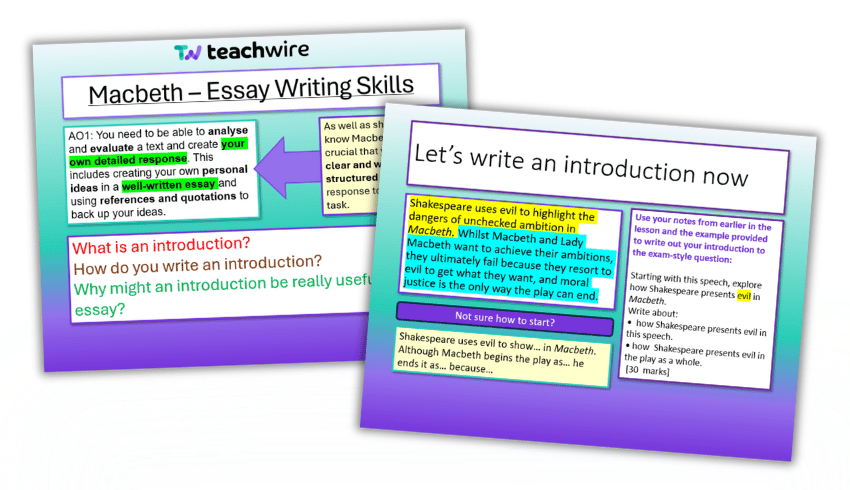Banquo quotes – 7 quotes from Macbeth explained

Helen Mears examines the role played in Macbeth by the loyal, steadfast and doomed Banquo…

- by Helen Mears
- English teacher and British Shakespeare Association education committee member

These Banquo quotes from Shakespeare’s Macbeth will provide students with rich insights into the themes of fate, ambition and integrity…
Who is Banquo?
Banquo is Macbeth’s friend. He’s a fellow captain in the Scottish Army, which has been fighting a rebellion against King Duncan.
Banquo is with Macbeth when they encounter the Weird Sisters after a battle. He hears them prophecise that Macbeth will be King.
Intended as a foil or contrast to Macbeth, Banquo remains loyal to Duncan. He becomes a victim of his friend’s campaign to take the Crown.
Banquo quotes
Banquo’s suspicions
“Good sir, why do you start; and seem to fear things that do sound so fair?”
(Act 1, Scene 3, lines 52-53)
Immediately after the Weird Sisters speak their prophecies Banquo notices the strength of Macbeth’s reaction. He seems to react nervously to the suggestion he could become King. This reaction may be the root of Banquo’s suspicions after the murder of Duncan.
Questioning his sanity
“Were such things here as we do speak about? Or have we eaten on the insane root that takes the reason prisoner?”
(Act 1, Scene 3, lines 81-83)
Banquo’s own reaction to the Weird Sisters is to question his sanity and wonder whether the witches existed at all. The ‘insane root’ was hemlock, which was believed to cause madness in those who consumed it.
Macbeth essay writing resource

This free, detailed Macbeth essay two-lesson resource pack contains two comprehensive PowerPoints which will support KS4 students in constructing coherent and clear essay structures for an exam-style question.
We also have Macbeth display posters and a Macbeth revision resource pack featuring 20 lessons’ worth of material.
Allegiance to Satan
“What, can the devil speak true?”
(Act 1, Scene 3, line 105)
On hearing that Macbeth is to be named Thane of Cawdor, Banquo’s immediate and natural reaction is to link the witches to the devil.
To the Jacobeans, a witch was someone who had sworn an allegiance to Satan. This means that Banquo’s response would resonate with the contemporary audience.
A warning
“And oftentimes, to win us to our harm the instruments of darkness tell us truths, win us with honest trifles, to betray’s in deepest consequence.”
(Act 1, Scene 3, lines 123-125)
In the brief, closeted conversation that Macbeth and Banquo have after the revelation that he is to be Thane of Cawdor, Banquo warns Macbeth about listening to the Weird Sisters.
He explains that those in league with the devil may tell a small truth to lure a listener in, before leading them to graver consequences. His warning proves prescient.
More Banquo quotes to analyse
Dramatic irony
“This guest of summer, the temple-haunting martlet, does approve, by his loved mansionry, that the heaven’s breath smells wooingly here”
(Act 1, Scene 6 lines 3-5)
Shakespeare uses dramatic irony at the beginning of Act 1, Scene 6. Both Banquo and Duncan comment on the pleasant aspect of Macbeth’s castle at Dunsinane. They are both soon to become Macbeth’s victims.
Trouble sleeping
“A heavy summons lies like lead upon me, and yet I would not sleep”
(Act 2, Scene 1, lines 6-7)
Banquo’s observation that he’s unable to sleep because of the dark thoughts he’s having is interesting. This is because it foreshadows the trouble that Macbeth and his wife will have sleeping following the murders they’re responsible for.
The implication is that Banquo is already fearful of what Macbeth might do to become King.
Flattering the king
“Thou hast it now: king, Cawdor, Glamis, all, as the weird women promised, and, I fear, thou play’dst most foully for’t”
(Act 3, Scene 1, lines 1-3)
Fittingly, Banquo’s final thoughts are of saving his son, Fleance. In the early 1600s it was believed that Fleance was an ancestor of James I.
So in creating the decent, loyal Banquo, Shakespeare is flattering the new King of England. He’s also providing a good foil to Macbeth’s evil.
Helen Mears is an English teacher who sits on the education committee of the British Shakespeare Association. Follow her on Twitter at @shakesmears. Browse our Shakespeare Week resources.










